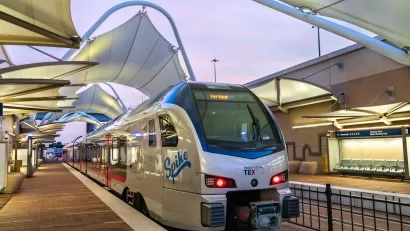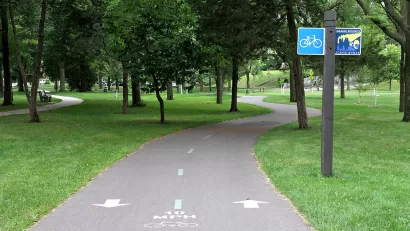The Daily Source of Urban Planning News

BLOG POST
Is Crime More Concentrated in Spread-out Cities?
Our nation's most transit-friendly cities have lower crime rates than many sprawling cities- yet some people seem to feel safer in sprawling cities because they believe that in sprawl, crime is concentrated in just a few neighborhoods. Is this correct?

Rochester Approves Tenant Protections
The city adopted the strictest possible version of New York state’s ‘Good Cause’ eviction protections, which cap rent increases at 10 percent.

NYC Congestion Pricing Plan Threatened by Legal Challenges
The plan to charge motorists driving into parts of Manhattan is being challenged in multiple courts.

BLOG POST
Smart Cities and Utilities: Enhancing Energy Efficiency Through IoT Integration
Learn how IoT integration in utilities is boosting energy efficiency in smart cities, aiding urban planners in sustainable development.

Portland Traffic Deaths Surpass 2022 Number
This year, 69 people have died in traffic crashes in Portland, Oregon, nearly twice as many as in 2018, when the city began its Vision Zero program.

North Texas Transportation Council Advocates for Road Safety, Rail Projects
The North Texas Regional Transportation Council issued a series of recommendations for state legislators that include more support for road safety projects and high-speed rail.

How to Make Greenways Better
Adding amenities such as public restrooms and shade trees can make greenways like Detroit’s Joe Louis Greenway more inviting and comfortable for their users.

Los Angeles County Secures Funding for Beach Protection
L.A. County is getting a $1 million grant from the California Ocean Protection Council to develop a Regional Coastal Strategic Adaptation Plan to protect its beaches from climate change impacts while prioritizing equitable access and sustainability.

Food Insecurity in LA County Remains Alarmingly High Despite Some Improvement
Food insecurity in Los Angeles County remains above the national average, disproportionately affecting low-income and minority households, with researchers calling for expanded assistance and systemic solutions to address ongoing disparities.

How US Cities Can Prepare for Climate Disasters
Resilience, encompassing infrastructure, governance, economic strength, and social cohesion, is critical for cities to mitigate rising climate risks like flooding, wildfires, and heat, ensuring long-term recovery and adaptability.

Rural Renters at Increased Risk of Eviction
Rural residents often have a harder time accessing legal assistance and eviction prevention resources.

California E-Bike Rebate Demand Far Exceeds Supply
The queue to apply for California’s new e-bike incentive program, which only offered 1,500 vouchers, reached 100,000 people.

Oakland Adopts Urban Forest Plan to Foster Equity and Environmental Justice
The Oakland City Council has adopted its first Urban Forest Plan, a 50-year roadmap focused on equitable tree care, canopy preservation, and environmental justice to benefit underserved communities.

USDOT Issues Accessibility Guidelines for Transit Stations
A new rule aims to clarify accessibility requirements to help state and local DOTs upgrade their facilities more quickly to meet ADA standards.

Silent Threat: America’s Abandoned Oil Wells and the Danger Beneath
Abandoned oil and gas wells across the U.S. pose significant environmental, health, and safety risks, with many leaking hazardous gases and chemicals, highlighting regulatory failures and the immense financial burden of remediation.

DC Suburban Light Rail Expansion Prompts Mixed-Use Development
The Purple Line’s expansion into Maryland suburbs in 2027 has spurred TOD along the line.

Students Drive Solutions for Environmental Justice Through Video Challenge
The Environmental Justice Video Challenge empowers students and communities to collaboratively address environmental inequities through innovative data-driven strategies, resulting in impactful projects and fostering local leadership.

AI Uncovers Forgotten Oil Wells: A High-Tech Solution to Environmental Hazards
Researchers are using artificial intelligence, drones, and sensors to locate and assess undocumented orphaned oil and gas wells, addressing their environmental and climate risks by identifying high-priority sites for plugging and methane mitigation.

Detecting Invasive Species Early Through Citizen Science
Community science platforms like eBird and iNaturalist enhance early detection of invasive species, complementing professional surveillance and highlighting the need for stronger collaboration between the public and official authorities.
Pagination
Heyer Gruel & Associates PA
City of Moreno Valley
Institute for Housing and Urban Development Studies (IHS)
City of Grandview
Harvard GSD Executive Education
Salt Lake City
NYU Wagner Graduate School of Public Service
City of Cambridge, Maryland
Urban Design for Planners 1: Software Tools
This six-course series explores essential urban design concepts using open source software and equips planners with the tools they need to participate fully in the urban design process.
Planning for Universal Design
Learn the tools for implementing Universal Design in planning regulations.



































